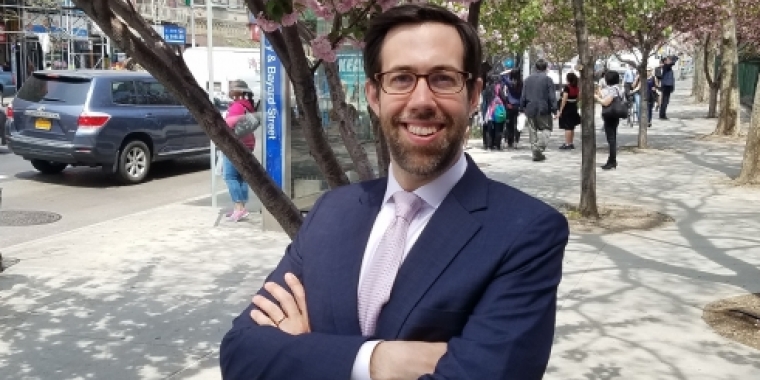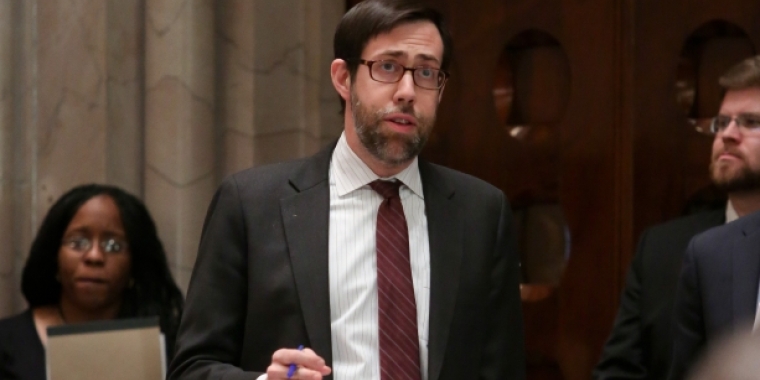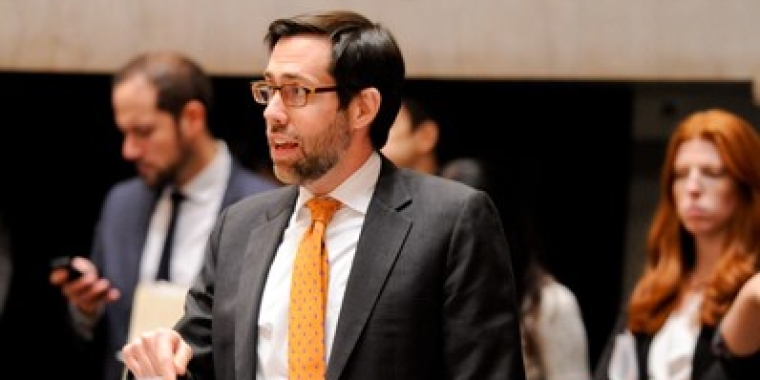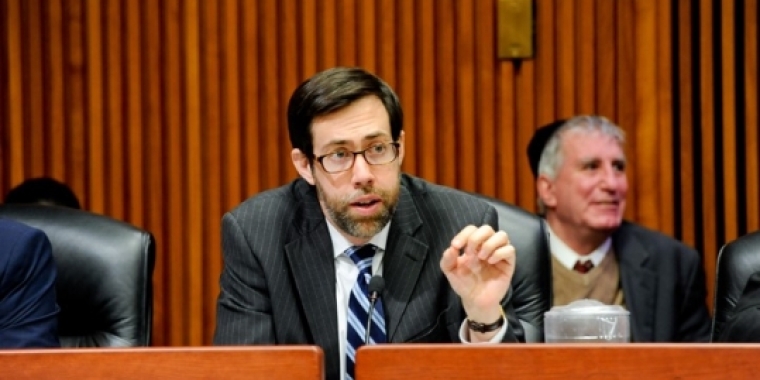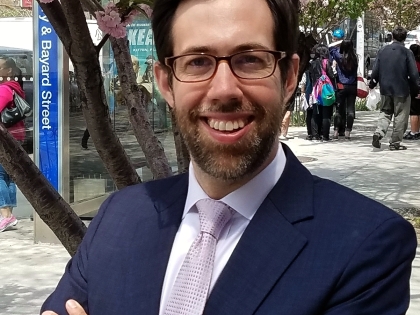
Legislative Gazette: Session ends without redistricting reform
B, Legislative Gazette
As state lawmakers move forward with redistricting this summer, a looming threat by Gov. Andrew Cuomo to veto gerrymandered Senate and Assembly maps will be hanging over their heads.
Cuomo introduced a program bill (A.5388/S.3419) to reform the redistricting process, by creating an independent commission to draw new districts, but the bill failed to pass this legislative session. The governor's next course of action could be to veto the district maps drawn by the Legislature, which he has pledged to do if he believes they are drawn to promote political interests. If there is a veto, it might be left to the courts to draw new legislative districts in time for the state's 2012 election cycle.
"We expect that [Cuomo] will honor his commitment, and I know that he will," said Sen. Martin Malave Dilan, D-Brooklyn, when asked if he believes the governor will veto the lines if an independent commission is not formed.
Dilan is a member of The New York State Legislative Task Force on Demographic Research and Reapportionment, the body that under existing law draws new Senate, Assembly and congressional lines every 10 years.
Of a potential Cuomo veto, Dilan said "24 members of the Democratic conference in the Senate, which is more than enough to ensure that [Senate Republicans] cannot override his veto, have already written to [Cuomo] that when he vetoes an unfair plan that is not done by a commission that we will sustain his veto, so we expect him to do the right thing."
The prospect of having the courts draw the districts is more palatable than the maps being drawn under the existing process, according to Sen. Adriano Espaillat, D-Manhattan, who said "it is much better to have an impartial judge draw the lines than to have a process that is plagued with gerrymandering and archaic practices that lead to the distrust of the voters."
Proponents of an independent commission say a conflict of interest is created when lawmakers or their conferences are empowered to draw their own districts because it gives them the ability to help their re-election bids by choosing what areas, and thus what voters, are included in their districts.
The legislative task force that draws districts under existing law is comprised of four lawmakers and two non-legislative members appointed by legislative leaders.
When Dilan was asked if the task force has the ability to draw lines that are not politically motivated, he said "the last three decades have shown us that the Assembly takes care of its majority and they are Democrats, and the Senate Republicans have taken care of its majority, so I think if we are going to use history as a barometer, I think that they can't."
Cuomo's bill met with opposition on the other side of the aisle throughout the session and has not left the committee it was first reported to back in February in either house. The Assembly Governmental Operations Committee and the Senate Rules Committee.
Senate Republicans have questioned the bill's constitutionality and called it partisan.
Their plan is to create an independent commission through a constitutional amendment, which Senate Majority Leader Dean Skelos, R-Rockville Centre, has said is the only constitutional way to set up such a commission.
A bill (S.3331/A.5271) that proposes a constitutional amendment was introduced by Sen. John Bonacic, R-Mount Hope, and Assemblywoman Sandra Galef, D-Ossining. It was passed in the Senate in March but has not seen movement in the Assembly since it was referred to the Governmental Operations Committee in March. The legislation has been referred to the Attorney General's Office and the judiciary for their opinions.
The Senate Republican plan would put off creating an independent commission until the next decennial redistricting process, following the 2020 census, which has led to opposition by Senate Democrats and good government groups who have called it a stall tactic designed to help the GOP maintain control of the upper house. Reform advocates want legislation to be passed to set up a commission for the current redistricting process.
New York Public Interest Research Group's Legislative Operations and Research Coordinator Bill Mahoney said legislation would have to be passed soon to be workable for the current redistricting process that has to be done in time for the state's 2012 electoral cycle, which is typically kicked off with September primaries.
"If the Legislature ignores redistricting much longer, the process will wind up being partisan, rushed and opaque," said Mahoney. "Action on redistricting must not wait until next year."
The Military and Overseas Voter Empowerment Act could farther shorten the time frame for the redistricting process by requiring an earlier primary to better comply with the federal law that mandates absentee ballots to be sent out to military personnel 45 days before an election. The federal act caused a number of logistical problems in 2010 because of time constraints between September primaries and the November general election.
As the regular legislation drew closer to an end last week, 7 percent of voters identified passing redistricting reform to create an independent commission as their No. 1 priority, but general support for the legislation has been in decline, according to the results of a Siena Research Institute poll.
Creating an independent commission received its lowest level of support by voters in three months according to the June 13 Siena poll, with 49 percent of voters saying they support creating the commission. That support was recorded at 58 percent in April.
The 819 voters polled ranked independent redistricting reform last on a list of five priorities, with 7 percent of them saying creating an independent redistricting commission is the their top legislative priority and 20 percent saying it is their second-highest priority.
A property tax cap came in first, with the most people considering it their No.1 priority, followed by new ethics laws for state legislators, legalizing same-sex marriages and extending rent regulations.
The poll has a margin of error of plus or minus 3.4 percentage points.
Redistricting reform has been ranked at the bottom of similar lists in polls throughout the latter months of the session. Although redistricting reform is not the top priority, it is a top priority, and that is a good sign, according to Mahoney.
"In one of the most challenging economic times in decades, the fact that 7 percent of New Yorkers polled feel that this somewhat wonky issue should be a priority above issues that directly impact their pocketbooks such as a property tax cap and rent control, is nothing short of remarkable," said Mahoney, who added that this "is a message that should not be lost on any legislator."
Redistricting reform has been out of the political limelight in recent months as other issues were placed on the front burner as part of Gov. Andrew Cuomo's three legislative priorities for the end of session.
However, Espaillat said it is a priority even though it was not in the top three.
"Because it was not in [Cuomo's] list does not mean that it is not important to the governor or to us. I think it is very much there, maybe in the top five," said Espaillat. "This has been a very contentious session with a lot of important issues that have been debated, many of which have been resolved, but this one should not be left behind."
Senate Democrats, including Espaillat and Dilan, held an interactive forum June 7 to try to galvanize support for the issue as the session came to a close. Experts and good government groups testified in front of a panel of senators who want to see Cuomo's redistricting reform program bill enacted.
The forum was web cast, and questions were asked via e-mail, Facebook and Twitter, although only a handful of questions asked were from the public.
A similar interactive forum was conducted by the Democrats in May on ethics reform. Both events saw a handful of tweets by the public, but the vast amount of tweets were written by lawmakers and good government group representatives who testified.
Sen. Daniel Squadron, D-Carroll Gardens, who participated in both events and is a proponent of using social media to increase the public's involvement in legislative actions said "these interactive forums harness new technologies and social media to bring New Yorkers into the conversation, by bringing more transparency to Albany. The forums allow constituents to hold their representatives accountable and make sure that key issues don't die in a back room."
Click here to view this story
